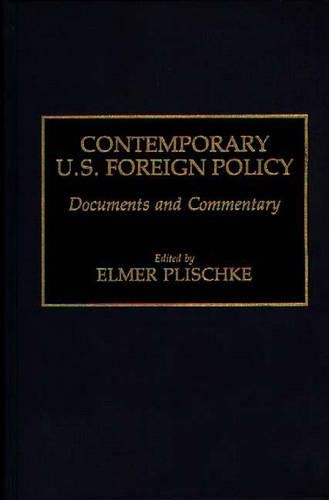
Contemporary U.S. Foreign Policy: Documents and Commentary
(Hardback)
Publishing Details
Contemporary U.S. Foreign Policy: Documents and Commentary
By (Author) Elmer Plischke
Bloomsbury Publishing PLC
Greenwood Press
12th March 1991
United States
Classifications
Tertiary Education
Non Fiction
327.73
Physical Properties
Hardback
872
Description
This is a collection of documents--including speeches and official statements--relating to selected issues of US foreign policy with a brief narrative introduction to each section. The documents date from the end of WWII to the late 1980s and focus primarily on events since 1960. . . . The topics chosen address most of the significant aspects of foreign policy, including how it is made, how it is managed, a catalog of general doctrines and functional policies, significant crises, continuing issues broken down along geographical lines, and the US role in international organizations. Thus the book becomes a handy reference that provides accurate statements about how and why US foreign policy was articulated at various times. Choice Since its inception, the United States government has pursued a liberal access and publication policy for its foreign relations documentation. Currently, diplomatic papers, the texts of all treaties, and most important executive agreements are systematically published, resulting in the public availability of massive quantities of official documents. In this work, Elmer Plischke has produced a collection of carefully chosen documents and commentary that constitute a comprehensive anthology of U.S. foreign policy resources for the post-World War II era. Plischke has combined critical and illustrative segments pertaining to a wide range of topics that altogether provide broad-scale coverage of America's contemporary foreign relations. The method employed for choosing documents involved three approaches: securing key documents, surveying basic documentary collections to locate representative records, and preparing a chronology of important events. The contents of the volume are arranged topically, with major segments devoted to foreign policymaking, the conduct of foreign affairs, general foreign policy principles and presidential doctrines, crisis diplomacy, basic and specialized functional foreign policies, and regional issues. Each chapter is divided into subsections, with documents arranged either topically or chronologically. Types of documents excerpted include policy pronouncements of government leaders, legislative enactments, international compacts, diplomatic exchanges, presidential doctrines, and international declarations and resolutions. Internal cross-referencing links related subjects and documents, and citations provide sources and guidance to additional materials. Students of U.S. history, foreign relations, political science, and international affairs will value this work as a useful reference tool, and academic and public libraries will find it an important addition to their collections.
Reviews
"This is a collection of documents--including speeches and official statements--relating to selected issues of US foreign policy with a brief narrative introduction to each section. The documents date from the end of WW II to the late 1980s and focus primarily on events since 1960. These materials represent a view of foreign policy as seen from the White House and the US State Department; as such they are supportive and noncritical, and offer an "official explanation" with a mild dose of government propaganda.... [T]he topics chosen address most of the significant aspects of foreign policy, including how it is made, how it is managed, a catalog of general doctrines and functional policies, significant crises, continuing issues broken down along geographical lines, and the US role in international organizations. Thus the book becomes a handy reference that provides accurate statements about how and why US foreign policy was articulated at various times. Of great interest as a reference work for advanced undergraduate and graduate students."-Choice
A collection of carefully chosen documents and commentary that constitute an anthology of US foreign policy resources for the post-World War II era. The contents are arranged topically, with major segments devoted to foreign policymaking, the conduct of foreign affairs, general foreign policy principles and presidential doctrines, crisis diplomacy, basic and specialized functional foreign policies, and regional issues. Types of documents excerpted include policy pronouncements, legislative enactments, international compacts, diplomatic exchanges, presidential doctrines, and international declarations and resolutions. Internal across-referencing links related subjects and documents, and citations provide sources and guidance to additional materials.-Reference & Research Book News
This is a collection of documents--including speeches and official statements--relating to selected issues of US foreign policy with a brief narrative introduction to each section. The documents date from the end of WW II to the late 1980s and focus primarily on events since 1960. These materials represent a view of foreign policy as seen from the White House and the US State Department; as such they are supportive and noncritical, and offer an "official explanation" with a mild dose of government propaganda.... [T]he topics chosen address most of the significant aspects of foreign policy, including how it is made, how it is managed, a catalog of general doctrines and functional policies, significant crises, continuing issues broken down along geographical lines, and the US role in international organizations. Thus the book becomes a handy reference that provides accurate statements about how and why US foreign policy was articulated at various times. Of great interest as a reference work for advanced undergraduate and graduate students.-Choice
"A collection of carefully chosen documents and commentary that constitute an anthology of US foreign policy resources for the post-World War II era. The contents are arranged topically, with major segments devoted to foreign policymaking, the conduct of foreign affairs, general foreign policy principles and presidential doctrines, crisis diplomacy, basic and specialized functional foreign policies, and regional issues. Types of documents excerpted include policy pronouncements, legislative enactments, international compacts, diplomatic exchanges, presidential doctrines, and international declarations and resolutions. Internal across-referencing links related subjects and documents, and citations provide sources and guidance to additional materials."-Reference & Research Book News
Author Bio
ELMER PLISCHKE is Professor Emeritus at the University of Maryland. He is author of Foreign Relations: Analysis of its Anatomy (Greenwood Press, 1988) and Diplomat in Chief: The President at the Summit (Praeger, 1985). He has written dozens of articles for scholarly journals, including World Affairs, Review of Politics, and Presidential Studies Quarterly.
